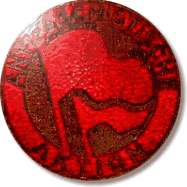| Station 6 (at the company's area) |
The KPD (Communist Party of Germany) - a resistance group at Topf & Soehne
During the stage of establishing and solidifying the national-socialist control, the then-strong workers' movement of Erfurt was violently fought and pursued. Leading members of KPD (Communist Party of Germany) and SPD (Social-democratic Party of Germany) were imprisoned and the social-democratic and communist newspapers were forbidden. Nevertheless a few people offered resistance after 1933 too. Apart from the production and spreading of newspapers and leaflets, , the creation of resistance groups in firms was achieved or attempted. Such groups existed in several big companies in Erfurt. picture: badge of the KPD-initiated "Antifascist action" from 1932
picture: badge of the KPD-initiated "Antifascist action" from 1932Several folks were active in resistance at Topf & Soehne too. One Member of the illegal KPD group was Friedrich Schiller. He was active at the workers' movement early, was a member of the "Spartakusbund" and later member of the KPD. In the 1930s he was taken into "protective custody" by the Gestapo several times. Beginning in 1937 he worked at Topf & Soehne as a boiler-smith. The resistance group was built up by Bernhard Bredehorn, who was a member of the KPD too. On April 1 1933 he was arrested and imprisoned in several concentration camps for about two years. Beginning in 1936 he worked at Topf & Soehne as a welder. After the end of the war Bredehorn became the first president of the police of Erfurt.
The resistance group spread illegal writings and stood up for prisoners of war and forced labourers. There is nothing known about criticism of the delivery of the crematories to the concentration camps by members of the resistance group. The plumber Heinrich Messing, following his own statements, was active in the illegal resistance. In contrast to the other communist workers Messing was directly involved in the assembly of the crematories in Auschwitz-Birkenau. Among other things he installed an elevator of company Linse and assembled the aerators and deaerators for the gas chamber. There's nothing passed on about a later comment on his work at the extermination camp.
Close this window >>>